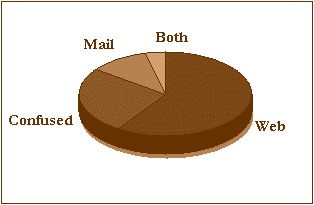newer log

Thanks to an alert reader we have retroactively fixed yesterday to be Wednesday, according to custom.
A reader intent upon keeping us honest writes:
Funny how Orbach's "market induced" collapse of morals happens to coincide with the unmining of religion, tradition, and social mores that occured in the late 60s, rather than coinciding with the introduction of market capitalism, which occured considerably earlier than that. She (and presumably, you) are seeing what you want to see here. I applaud the freedom we gained through the loosening of the ties of the old order, but have no illusions as to what the costs of freedom are.
It must be nice to have no illusions about what the costs of freedom are! It's always hard to be sure, though, isn't it? I mean, the tricky thing about illusions is that they look so much like reality.
I don't think Susie Orbach, in the piece I quoted from yesterday, was trying to pin the "moral panic" on market capitalism per se; a closer reading of her article would probably show that she is putting some of the blame on a particular way of thinking about the market, and the world as a whole, that may be considerably more recent.
In any case, it's not the "moral panic" part of her piece that I meant to be agreeing with. I think that in fact the world is more moral (moraler?) this decade than in probably any other decade since moral agents showed up. But we're still far from perfect, and I think that some of the problems that we still have result from overapplying the metaphor of the market. As Orbach says (and I'll quote it again, just because I think it's so important):
The language of the market - acquisition, efficiency, growth - transforms the landscape inside of us. The market is not a phenomenon outside of us that we can simply critique, it becomes a motivating force shaping our desires and our attitudes towards our needs in powerful and often disconcerting ways.
This is true of any powerful metaphor, of course, but in our time the market is one of the strongest ones. I don't mean to belittle markets: it turns out that a market is a very good way to run an economy, for instance. But it's also easy to misapply the metaphor, to analyze everything in market terms, and to oversimplify ourselves into various corners. Because, of course, the marketplace isn't the only metaphor we should be applying to our lives.
A good example of the overapplication of the metaphor of the market is the "Law and Economics" school of law. In its purest and most extreme form, it teaches that all of the law is (and/or ought to be) designed to "maximize social wealth". (A recent Reason has a very good interview with Richard Posner, one of the founders of the Law and Economics school, in which he describes how his views on the subject have become somewhat less pure with real-world experience.)
Now this is benign enough on its face. You can analyze the law as a maximization process without going too far wrong (IMHO), and you can label the thing that it's trying to maximize as "social wealth", and you may come up with a useful theory of law.
On the other hand it's all too easy to notice that word "wealth" in there, and decide that social wealth is probably sort of like material wealth, and that maybe to a first approximation they're really the same thing, and since the marketplace is a good way of maximizing material wealth, it must be the proper function of law to lubricate the marketplace. And since it's easy to convince oneself that all sorts of things are part of "the marketplace", we end up with kids punished for not watching commercials in school, or governments taking property from one private party in order to give it to another, or companies treating customers like mere revenue sources to be squeezed, rather than say like partners.
Now none of these bad things are the fault of the market itself; a real market-fan might point out that they all stem from misunderstandings of the market. The problem, I would say, is with fallible humans overapplying the market metaphor. There are other metaphors we should also employ if we're to have a rich enough picture of the world: metaphors of nutrition, of growth, of family, of love. And, for that matter, of games, of entertainment, of fly-fishing. I agree with Orbach that metaphors are important, and that the metaphor of the market has been overused, with not entirely pleasant consequences. I don't agree with everything she says; I suspect I'm more pro-market in general than she is. But I'm not someone who feels it necessary to utterly repudiate anyone who doesn't completely agree with me.
So if we're trying to get rid of all of our illusions about the costs of freedom, here's something I think is true: freedom does not require that we subordinate all of our other metaphors to the model of the marketplace.
Ooops! Erroneous VeriSign-Issued Digital Certificates Pose Spoofing Hazard:
VeriSign, Inc., recently advised Microsoft that on January 30 and 31, 2001, it issued two VeriSign Class 3 code-signing digital certificates to an individual who fraudulently claimed to be a Microsoft employee. The common name assigned to both certificates is "Microsoft Corporation". The ability to sign executable content using keys that purport to belong to Microsoft would clearly be advantageous to an attacker who wished to convince users to allow the content to run.
Yeah, a bit. So much for that security model!
VeriSign to allow Web site names in Arabic, Hebrew and Thai.
A blog by Neil Gaiman! About his forthcoming "American Gods" novel. (Link from Medley.)
From geegaw, The Creative Life: Science vs Art / Interview with Gregory Chaitin:
It takes tremendous emotion to do good mathematics, it is very difficult. You have to be inspired and you have to have tremendous emotional drive to do it. You are not a machine, by any means, because the act of creation is magical. There is no rule for doing it in science, the same way there is no rule for doing it in the arts. There is no systematic way to do it. They can't teach you in school how to do it, they can just get out of your way!
I'd like to just mention in passing that Greg Chatin has an office just downstairs from me. Just in passing. *8)
Steve's magnetic poetry; very lyrical. (See also my magnetic poetry, which I fear rather pales in comparison.)
Who needs rust to shine?
No entry yesterday, due to a birthday in the family, general busyness, and having gotten another new computer to set up. This one will be replacing my main work laptop, so there's considerably more work involved in getting it Just Right (or even Acceptable).
On NPR yesterday, they were interviewing various music fans about the Rock and Roll Hall of Fame, and one of the interviewed said that he thought that Alanis Morissette should be "abducted into the Hall of Fame".Sort of an interesting screenplay idea...
The Log is Pink! Well, sometimes. On my usual laptop, and on the family machine at home, this here log is in colors I like quite a bit: a family of moderately rich and balanced browns. On the old server in my office, it's much more greenish and not as pleasant, but I'd always just assumed that that monitor was about to explode or something. On the machine that I got the other day to replace that old server, it's an oddly pale but still unobjectionable brown.
But on the new laptop that showed up yesterday, it's positively pink! I dunno if I can take it. And here I thought I was using browser-safe colors and all. Sheesh!
My server's name (on the local LAN) is "catnose". Typing the URL into my browser this morning, I lost focus for a moment and left to themselves my fingers typed "catnose.com". Turns out that that leads to a kinda interesting site out there in the Big Web. (Avoid the links to "Women of Desire"; they seem to have been captured by some stupid Celebrity Pics site with annoying popups.)
From Gordon Joly, Susie Orbach on how the market induced our moral panic. It's always nice to be reminded now and then why I remain at bottom a pinko tree-hugger, despite the appeal of the capitalist and libertarian sides of my nature.

The language of the market - acquisition, efficiency, growth - transforms the landscape inside of us. The market is not a phenomenon outside of us that we can simply critique, it becomes a motivating force shaping our desires and our attitudes towards our needs in powerful and often disconcerting ways.
The NORTH AMERICAN LICHEN PROJECT! (from honeyguide). Lichen Sampler, Lichen Portrait Gallery, Lichens and the Environment, Lichens and People, Lichen Links!
Speaking of speech, I've been poking around a little in the Spoken Word section on mp3.com, as hinted at Monday. I find I sometimes have a hard time telling whether or not there's irony going on. Of course if it were all in Latvian or something this would perhaps not be a problem.
At the moment (still without a source of non-English spoken-word audio) I'm listening to mp3.com's general Russian section. A mixed bag, of course, but on the whole good background music. And none of that distracting meaning stuff, for us non-Russian speakers at least...
A reader writes:
Saturday, March 17th. <laugh> Very, very, funny and cool :-)
I have to admit I'm very fond of Saturday's entry myself, and delayed posting this one so it could sit at the top of the page longer. I recommend that everyone who hasn't already read it should go read it, so that if you run out of time you'll miss the rest of today's entry rather than missing Saturday's. *8)
In fact a remarkably vocal and opinionated bunch of readers seem to have been typing into my input box in the last few days:
stop being so gullible/naive when it comes to beleiving the claims of political left or right. The newspaper recounts operate under bogus criteria.
In fact I tend not to put great faith in either of the (often indistinguishable) major parties; this reader can rest assured that just because I link to something doesn't mean I believe it. But data are data...
The Gore vs Bush "we wuz robbed" argument seems just a rehash of the too-familiar Pragmatist vs Platonist argument that rages in Nomic. The numbers you link to don't adress that core problem, and are presented in a highly biased manner to boot.
Again, linkage doesn't constitute endorsement. The numbers are interesting; the biases are also interesting. Platonists and Pragmatists are exponents of two different philosophies which sometimes raise their heads on Nomics, or at least on Agora Nomic (see for instance this log entry back in January that gives among other things the Subordinate Legal Code of the Secret Eka-Platonist Cabal).
Platonists tend to believe that (roughly) there is One True Gamestate, which is the state in which the game is by virtue of its rules and the moves that players have made, and that if people think the state of the game is something else, they are simply mistaken. The Pragmatist view is (again roughly) that if everyone thinks that Froboz won the TortKeepor Election last year, and that therefore all the actions he took as Tortkeepor were really valid and effective, if someone (typically some durned Platonist) shows up and points out that the announcement of the Election was actually posted five minutes after the legal deadline, and the Election was therefore null and void, it doesn't really matter and we shouldn't be expected to go back and try to recompute the "real" gamestate.
Something like that. So the Pragmatist / Platonist dispute in the Gore / Bush election would look something like "if it turns out that Gore really would have won if all the ballots had been optimally counted, in what sense is Bush still the (legitimate) President anyway?" Of course I don't think anyone doubts that Bush is President; I guess the remaining question is how upset to get about it if it turns out he shouldn't be...
Somewhat relatedly, another reader writes:
Check out The Omega Game by Steven Krane. It's a story about a lethal version of Nomic.
The Amazon page for "The Omega Game" has an interesting mix of very positive and very negative reviews. Another one for the wish list...
More readers write:
Love can sweep you off your feet and carry you along in a way you've never known before. But the ride always ends, and you end up feeling lonely and bitter. Wait. It's not love I'm describing. I'm thinking of a monorail. - Jack HandeyA million monkeys were given a million typewriters. It's called the internet.- League Against Tedium
If you only ever read one book in your life, I highly recommend you keep your mouth shut. - League Against Tedium
"Brevity is the soul of wit" said Shakespeare. I say "Wank!" Thus I win. - League Against Tedium
Is that The League Against Tedium? And what if I say "Zot"?
But he shall not multiply horses to himself, nor cause the people to return to Egypt, to the end that he should multiply horses: forasmuch as the Lord hath said unto you, Ye shall henceforth return no more that way.
Nor wives, either, it seems (Deut. 17). Have to watch them replicators even in the best of circumstances.
efforts have been in vain! MWAHAHAHAHAH!!
mace are rebonged to us.
lovers are embraced by us.
face are real long to us.
This horse walks into a bar, and the bartender says "Why the long face?".
The morning hangs a signal
upon the mountain crest,
While all the sleeping valleys
in silent darkness rest.
-- Hymn #40
I love the land. The look of it, the sound of words about it. Basin and range, hill and dale, fens and summits. Part of the reason I love it is that I don't really know it all that well; I'm of a generation and a class for whom the land doesn't usually matter. I spend most of my life in buildings, and the roads between buildings cut easily through the hills. Land-words, land images, remind me of a time and a place (probably an idealized one) where the land matters.
We went to The Outdoor Mall yesterday (its real name is the absurd "Woodbury Common"), because it was gorgeous outside (if chilly in the wind) and a family Shopping Expedition sounded like fun. The road comes down one side of Central Valley, and the Mall is a huge scar of buildings and parking lot in a wide and middling populous valley. From the ground in the Mall, if you get out in the center of a courtyard away from the buildings, you can see mountains in three directions. Here at the end of winter, the trees and the ground are all exposed and stark. It's lovely. Despite standing in a place where the land has been extensively violated (not just used, but used in a way that doesn't respect it well), I still felt very much surrounded by it, situated. Just because of standing in that big bowl of earth and seeing it all around me.
I like the human voice, also. Why isn't there a whole pop culture based around recordings of people speaking? Speaking with emotion, with longing, with sorrow, with laughter? There's enormous industry and culture based around people using the voice as an musical instrument; why not around voice as voice? I'd like to run an audio stream of people talking, probably in a language I don't speak (so as not to distract me with meaning), with voices full of emotion, or artisticaly devoid of emotion.
Hm, what about the Spoken Word section on mp3.com? Well, that all seems to be in English; while there's certainly some pretty odd stuff there, I don't see the "artistic poetry readings in Russian" section. Looks like another quest in the making...

I had finished some code and checked it into the source tree, and I was sitting in my place reading newsgroups and arXiv abstracts and crafting heros at the HeroMachine for sport. And there came into my place another developer, a mighty coder and even a Project Leader of the group, and this Project Leader told me of a program that might be written. We talked of this program from one to another.
Where, I asked, was the specification of the output format of the program? And he answered me, saying that the specification was not yet written, but that there was on a file server a CGI script that would parse the format.
So I turned to my laptop, and accessing the file server I opened the CGI script. And together we found the block that parsed the output, and we saw that it was simple.
And again we talked of the program from one to another, and the Project Leader showed me an input dataset that he carried with him written upon a cartridge. How, I asked, would the program determine which of the files in the input directory were intended for it? And he nodded, and considered, and then he went away.
And I read weblogs.
Then in good time the Project Leader returned, and with him was another developer, also a mighty coder, and one who configures Linux boxes. And this developer said, well, I will write for you a module, and with this module you may determine which of the files in this input directory are for you, and you may use a stub in the meantime.
And my heart quickened. Is it, I asked, that I am to write this new program?
Now the developer nodded, and said that he had been making that assumption. And the Project Leader nodded also, and said that he had been making that assumption.
So with gladness I turned to my tools.
Seeing that this new program was like in form to an old program, I made for myself a copy of that old program under another name, and I pared away all that was not needful. And I wrote in the new program a comment, saying "do the real work here", and I coded in that place a stub, and that stub wrote a fixed output string and returned success.
And I shaped scaffolding for the new program, that wrote the input directory and its files and ran the program with all warnings turned on and displayed the output. Then I ran the stub program in the scaffolding, and it was good.
So now I will write the code that does the real work, and I will run the code in the scaffolding with different inputs, so that all of the paths of the code are exercised. And I will read through the code, from top to bottom and from bottom to top many times, seeing that no unwarranted assumptions have been made, and that the literals have been read from the project's literal pool and not hardcoded, and that the comments are clearly worded and that I have not crafted any truly odious hacks.
And when the code that I have written passes its unit test, and when all of the rough places within it have been made smooth, then I will check the new program into the source tree, creating the features and the tracks and marking them for integration, so that the other developers may look upon it.
And they shall praise me in email, and then we shall all go to lunch.
Poll results! If I were to set up a mailing list carrying the same text and images as this here Log, most of you would either keep reading just the Web version, or become confused:

Which is nice for me, as I can (continue to) be lazy, and cater to my readers at the same time. (More wine? How about one of these nice canapés?)
Speaking of mailing lists, though, I find I've subscribed to yet another one, after seeing a copy posted to Red Rock Eaters. It's the "GigaLaw" daily news, carrying interesting (so far) net/tech-related law items from the GigaLaw.com site. The summaries are short enough that I may actually read them.

Everyone's making their own heros at the Hero Machine (see for instance Captain Plurp). I'm thinking of making a Duo, but I'm sort of stuck on the names. So far I have "Podge" and "The Teemo Zurk", but I'm not yet entirely convinced.
I was thinking randomly about amateur comics the other day, and how people actually do it (drawing pens? computer programs?), and as I was wondering this Geegaw pointed me to this ArtBabe site on DIY comics. Small world!
Geegaw also points to the Stamp Ballot page at the Academy of American Poets; what poet would you like to see on a stamp? (I voted for Ogden Nash, less for the inherent quality of his poetry than for the fond childhood memories.)
The ant has made himself illustrious
Through constant industry industrious.
So what?
Would you be calm and placid
If you were full of formic acid? --
Yet another good reason to keep your anti-nastiness software up to date, and not open files that come unexpectedly in the mail. Note that this is not just "don't take files from strangers"; it includes files that come unexpectedly in the mail even from people you know and trust. They might not even know they've sent it.
In politics, here's a nice Salon summary of the Presidential recount(s) (go down to "Florida: the Running Tally"). I know, I know, we should put the past behind us, and stop worrying about the fact that the election was stolen. Somehow I'm having a hard time.
Agre linked to a recent American Spectator story on why Silicon Valley entrepreneurs tend to be so Liberal, as "conservative mystified by moral people who rise above self-interest".
I think it's too bad that voter.com died; but I think it's even more too bad that they're going to sell their subscriber database, including the political affiliations and declared interests of the people in it. Ick! We need some ethical expectations to form in this area, and quick.
Australians flirt with stupidity. (Don't you hate these blind links?)
Corporate Anthems! (Including the classic Ever Onward.)
best laid plans gang aft agley
lobsters stick to magnets.
troubles, lord, soon be over.
love, all your kissin', I don't know what I been missin, oh boy.
lovers embracing by a fountain.
jds
All your Judds?
base are belong to us. All your acid are belong to you. So all your HCl are belong to whom? --- from Cats' Chemistry Quiz Software Version 2.0eyes are like sunflowers
roads to hell are paved with good intentions
baste belong to us.
marbles in one ketchup.
trials and tribulations
hamsters are appeased by us
exponent are belong to us.
Have I mentioned lately that I have the best readers? Who would have thought there were people in the world that shared my obscure sense of loveliness? All your toes in one bundle.
top
earlier entries